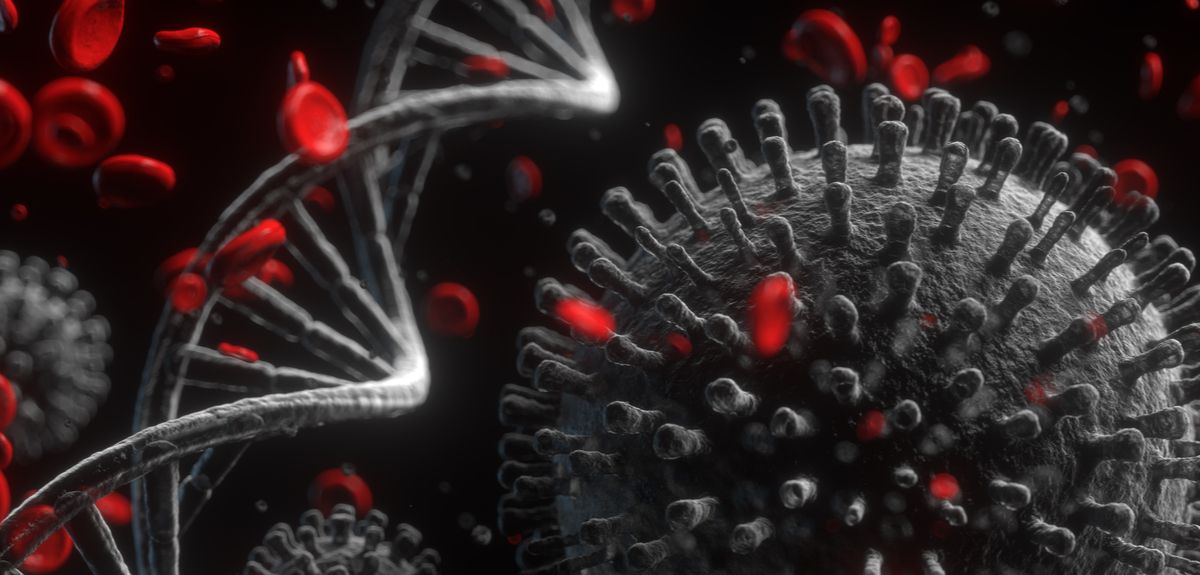
Latest data on immune response to COVID-19 reinforces need for vaccination, says Oxford-led study
A new study led by the University of Oxford has found that previous infection, whether symptomatic or asymptomatic, does not necessarily protect you long-term from COVID-19, particularly against new Variants of Concern.
The Protective Immunity from T cells to COVID-19 in Health workers study (PITCH) – conducted in collaboration with the universities of Liverpool, Sheffield, Newcastle and Birmingham with support from the UK Coronavirus Immunology Consortium – examined how the immune system responds to COVID-19 in 78 healthcare workers who had experienced either symptomatic or asymptomatic disease (66 vs 12). An additional eight patients who experienced severe disease were included for comparison.
Blood samples were taken monthly from one to six months post infection to examine different elements of the immune response. This included different types of antibodies – such as Spike-specific and Nucleocapsid-specific antibodies produced to target different parts of the virus, alongside B cells that manufacture antibodies and keep the body’s memory of the disease, and several types of T cell.
The preprint report posted on Research Square details a highly complex and variable immune response following COVID-19 infection.
Dr Christina Dold of the Oxford Vaccine Group and study author said: ‘Our study is one of the most comprehensive accounts of the immune response following COVID-19 in both symptomatic and asymptomatic individuals. We found that individuals showed very different immune responses from each other following COVID-19, with some people from both the symptomatic and asymptomatic groups showing no evidence of immune memory six months after infection or even sooner. Our concern is that these people may be at risk of contracting COVID-19 for a second time, especially with new variants circulating. This means that it is very important that we all get the COVID vaccine when offered even if you think you may have previously had COVID-19.’
The researchers used a new machine learning approach – nicknamed SIMON – to identify detailed patterns in the data and to see if initial disease severity and the early immune response could predict longer-term immunity.
Dr Adriana Tomic of the Oxford Vaccine Group and study author said: ‘Using machine learning is a new and exciting tool that allows us to dig down into large and complex datasets to draw out patterns that we would otherwise be unable to detect. For this study, we wanted to try to understand if there are immune factors that can predict how likely it is that a person can maintain immunity against SARS-CoV-2 over time.’
Using this approach, the researchers found an early immune signature, detectable one month post infection and linked to both cellular and antibody immunity, which predicted the strength of immune response measured at six months post infection. This is the first time that such a signature has been found and improves understanding of the development of lasting immunity. When serum samples (containing antibodies) obtained at one month and six months post infection were tested, the majority of samples from people who produced a weak immune response signature failed to show any neutralising antibodies against the Alpha variant, with none mounting a neutralising antibody response against the Beta variant. This raises the possibility that the immune memory of these individuals does not provide sufficient protection to prevent reinfection by these variants.
While the majority of people who had symptomatic disease did have measurable immune responses at six months post infection, a significant minority (17/66; 26%) did not. The vast majority of people who experienced asymptomatic disease (11/12; 92%) did not exhibit a measurable immune response at six months post infection. This implies that people who have previously been infected with COVID-19 should not assume they are automatically protected against reinfection and highlights the importance of everyone getting their COVID vaccination when they are offered it.
Health Minister Lord Bethell said: ‘This powerful study addresses the mysteries of immunity and the lessons are crystal clear. You need two jabs to protect yourself and the ones you love. I call on anyone invited to get vaccinated to step forward and finish the job so we can all get out of this.’
 Expert Comment: Church-to-mosque conversions grab headlines, but is funding the real crisis?
Expert Comment: Church-to-mosque conversions grab headlines, but is funding the real crisis?
 Expert Comment: Four years of full-scale war and Ukrainian resistance continues
Expert Comment: Four years of full-scale war and Ukrainian resistance continues
 Oxford and Liverpool join forces to tackle global challenges
Oxford and Liverpool join forces to tackle global challenges